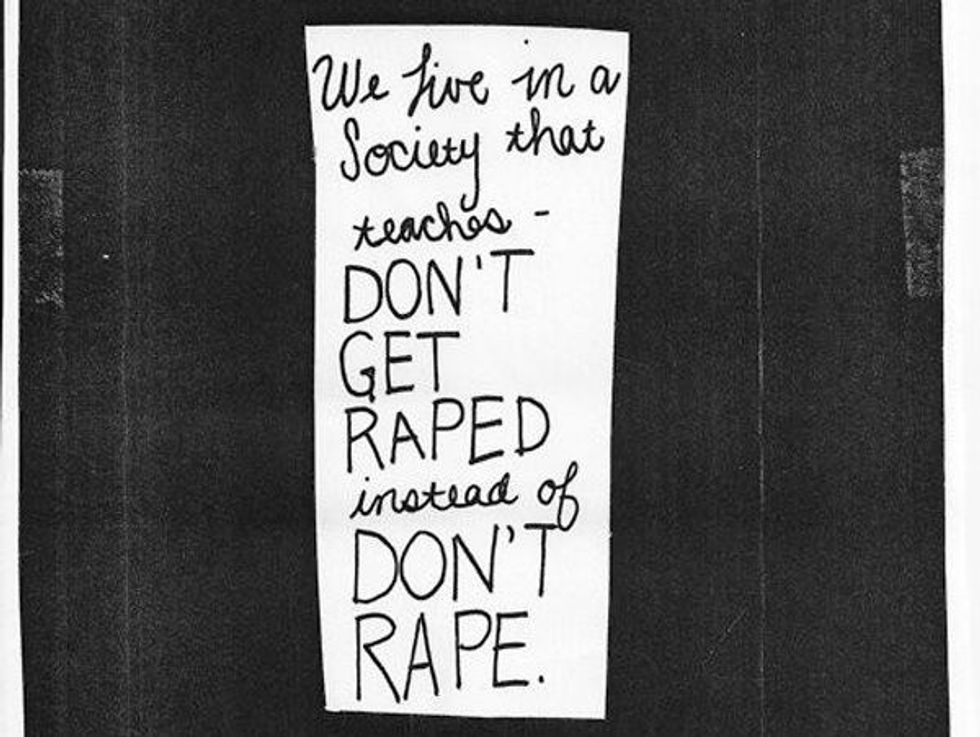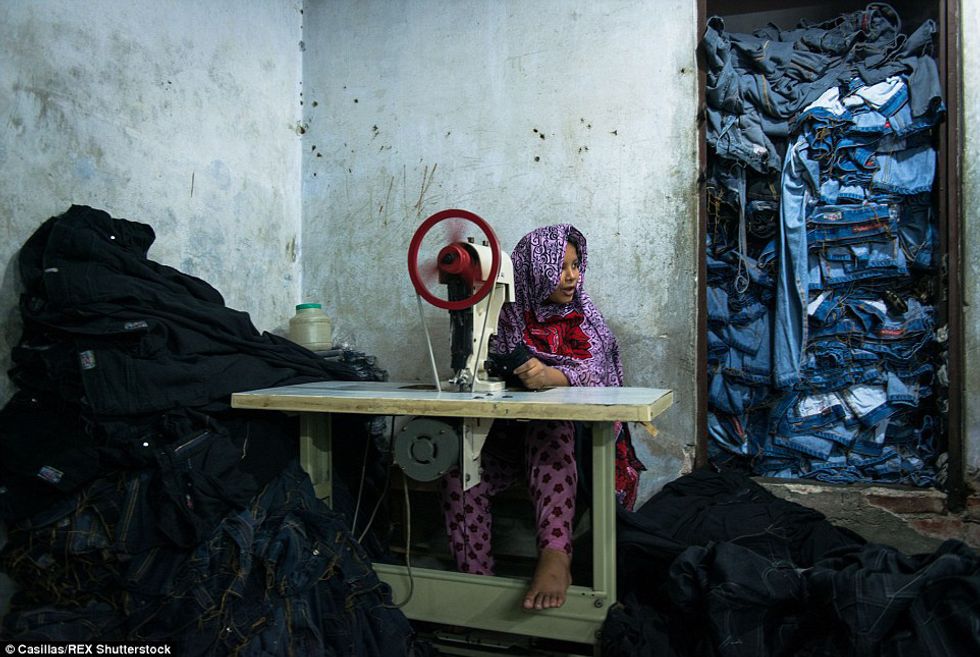If you asked me if there had ever been a time in my life when I felt the weight of oppression due to my gender, I don't think that I would truly be able to come up with an answer. Growing up, I attended a public school. There was no subject that was too illicit for our young minds and boys and girls were taught the same information. In fifth grade, we learned about puberty and had DARE officers come in to inform us about the effects of drugs and alcohol. I remember in my middle and high school that we were required to take health classes in which we would learn about sex and sexually transmitted diseases. In our English classes in high school, we were able to read "The Catcher in the Rye," "The Great Gatsby," and "To Kill a Mockingbird," books that had all been banned by many schools. Being kids, most of us probably either laughed or made faces during these controversial lessons, but, in actuality, we were lucky to receive such an education.
For my whole life, I was able to go anywhere, speak to, and hang out with whomever I wanted whenever I wanted. When I reached the legal age to drive, I went to the DMV on the day that I turned 16 and got my learner's permit. Then I practiced until I was able to pass my road test. I found a part-time job where I would work after school, opened up a bank account, and had control over my own money. I was able to register to vote and, the day after I turned 18 years old, I went to the polls to cast my ballot for the first time during the 2012 presidential election. When I was finally able to buy my first car, I did so in my own name.
However, it's important to keep in mind that, while there have been tremendous advancements toward gender-equality in many first-world countries that allowed me to do all of these things, it wasn't and isn't that way for all women. To freely exercise our right to vote, drive, have the ability to voice our opinions, get an education and work, and, simply put, possess ownership over our own lives – while things every human being should be able to do – are all rights that women have had to fight for.
Since that time, a lot of these basic human rights have really become second-nature to us – as they should be. All of these same liberties, as I was growing up, seemed incomprehensible for everyone, everywhere, not to have. It just seemed like common sense. I am a female and no matter where we live or what race we are, we are strong and capable. Like males, we too are human beings. As such, we should be able to do anything that any other human being can do and live our lives the way that we choose.
It's because of how logical these rights are to us and how inconceivable living without them is in this day and age, that it is also very easy to forget that there are still places around the world, some even in first world countries, where women are struggling to be treated the same as any other person. The term 'oppression' can mean a lot of things to many different people and while some may be fortunate enough to have been spared blatant gender discrimination being shoved in their faces, there are many areas in which these achievements for women have been few and far between.
Take even a country like the United States, for example. It's a first world country which has come so far in terms of gender-equality. While it seems that women have reached the same status as men, there are still those who are physically and financially oppressed. According to statistics from the Catalyst, women only earned 82.5 percent of men's salaries in 2014. "The gap doesn't close the higher women go. In 2014, the median weekly earnings for women in full-time management, professional, and related occupations was $981 compared to $1,346 for men."
This is only one of the many obstacles that women face. Last year, the United States was dubbed the third country to have the highest number of rape crimes. In 2014, statistics from the Centers for Disease Control and Prevention stated that nearly 20 percent of women in the United States have been raped or have suffered a rape attempt.
In Saudi Arabia, only recently and for the first time in the history of their country, women were given the right to vote, which is a monumental step for them. However, they are still not permitted to drive a car, go anywhere without a male chaperone, speak to any man who is not related to them, wear anything that would show off their beauty like makeup, or be able to freely compete in sports. Sadly, the list goes on.
In many parts of Pakistan and Afghanistan, women are not just treated unequally, but violence against them is also very common. Acid attacks, in which nitric acid is thrown at another human being, are a cruel and, unfortunately, regular occurrence that has left many women disfigured, blind, and disabled. Women who wear their veils too loosely, pursue romantic advances, or decline proposals, are often attacked by not only men, but, at times, other women as well. Often, and sadly, it occurs for no reason at all. Acid attacks have devastating effects physically, emotionally, and psychologically as well.
Women in Yemen and Iraq are also faced with daily struggles. Unlike in Saudi Arabia, these countries do allow women to drive. However, and for good reason, many women believe that they still have a long way to go. "Women’s status in Yemen leaves much to be desired. 'In [the Yemeni] narrative, driving is treated like a privilege for women, when really it should be natural that women have the right to drive a car,' says Amal Nasser, a young Yemeni," Mareike Transfeld, a writer, says in one of her articles.
India is another country in which women deal with many forms of oppression and discrimination due to their sex. The number of rapes in India are horrifically high and they occur every single day. In the first two months of 2015, Delhi police registered 300 reports of rape and 500 reports of molestation according to the Times of India.
There is Bangladesh, where women are forced to work in unregulated, inhumane, and unimaginable conditions, with long hours all just to sew a few pairs of garments for large companies and get paid next to nothing. "In Bangladesh, 3.5 million workers in 4,825 garment factories produce goods for export to the global market, principally Europe and North America. The Bangladeshi garment industry generates 80 percent of the country’s total export revenue. However, the wealth that is generated by this sector has led to few improvements in the lives of garment workers, 85 percent of whom are women," as stated by the War on Want, an anti-poverty charity based in England.
"The majority of garment workers in Bangladesh earn a little more than the minimum wage, set at 3,000 taka a month, far below what is considered a living wage, calculated at 5,000 taka a month. As well as earning a pittance, Bangladeshi factory workers face appalling conditions. Many are forced to work 14-16 hours a day seven days a week, with some workers finishing at 3:00 a.m. only to start again the same morning at 7:30 a.m. On top of this, workers face unsafe, cramped, and hazardous conditions which often lead to work injuries and factory fires. Since 1990, more than 400 workers have died and several thousand more have been wounded in 50 major factory fires. Sexual harassment and discrimination is widespread and many women workers have reported that the right to maternity leave is not upheld by employers."
Guatemala, one of the world's poorest countries, is another in which women have to deal with immense oppression and it is one of the worst places to live as a female. As stated by an article on the Mayan Families website – a non-profit organization which works to feed, shelter, and educate populations like that in Guatemala – "A ghastly, unbridled streak of murders left more than 700 women dead last year because they were female. Of those 700 murdered, less than 2 percent of killers have been brought to justice. For those cases that did make it to court, 90 percent of defendants were acquitted."
"From a day-to-day perspective, women suffer under an extremely male dominated culture that gives them no hope of changing their circumstances. Impoverished females constantly contend with domestic violence, rape, and the second-highest rate of HIV/AIDS after sub-Saharan Africa," the article says.
"Within Guatemalan and particularly indigenous culture, it’s the men who ultimately determine family size, allocation of finances, and even control basic human rights like who gets to eat and who doesn’t."
In Cameroon and other West African countries, over 50 percent of females are subject to breast ironing, where they are beaten and burned to try and stop their breasts from developing, a torturous act which is carried out in an attempt to protect girls and women from harassment, rape, and pregnancy by men. The inhumane practice can lead to breast cancer, tissue damage, issues with breastfeeding, as well as a number of other problems, according to medical experts. Unfortunately, these countries are not the only ones carrying out the awful act. In a recent report, the UK National Committee for UN Women said that the ritual is on the rise, affecting 3.8 million women and girls around the world, including those in England.
These are only a few of the places in which women from around the world suffer the wrath of men who believe that they are a superior sex. While I am so lucky to be able to say that I have really never been told that I couldn't do something specifically because of my gender, many other women, sadly, cannot say the same.
It's hard to imagine that places like this exist in modern times – places in which women have to walk with their heads down for fear of being raped or harassed. They are not even allowed to leave their houses, to let their voices be heard, or to show their faces. There are places where the straightforward idea that women should be able to live their lives for themselves is not common knowledge.
Oppression of any kind and on any scale of anyone of any race and any sex anywhere is still oppression. Without acknowledgement, it can and will only continue to grow.

























